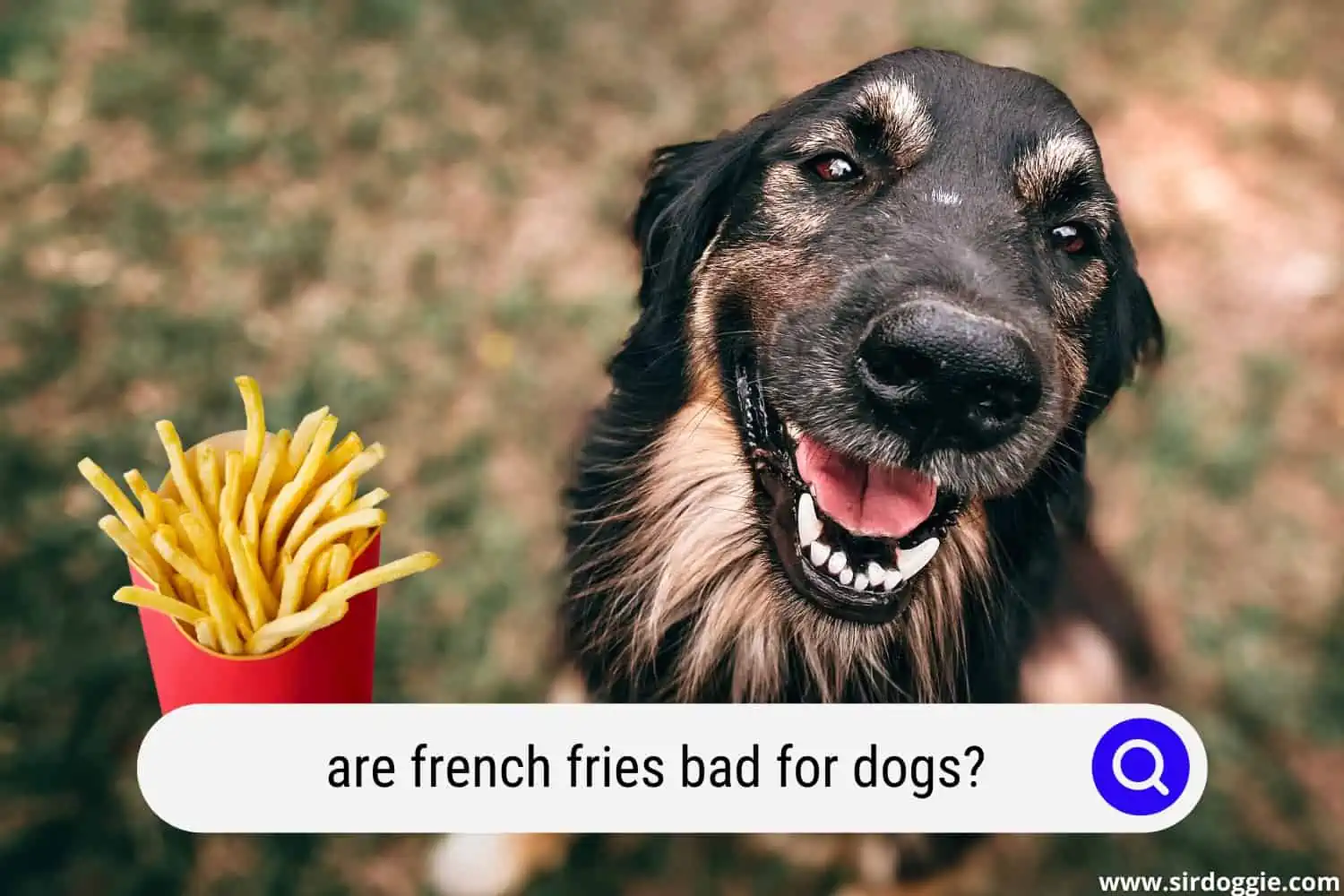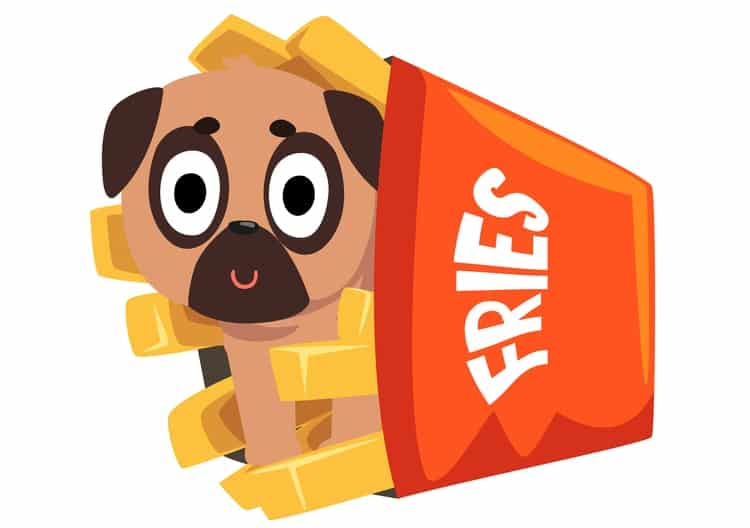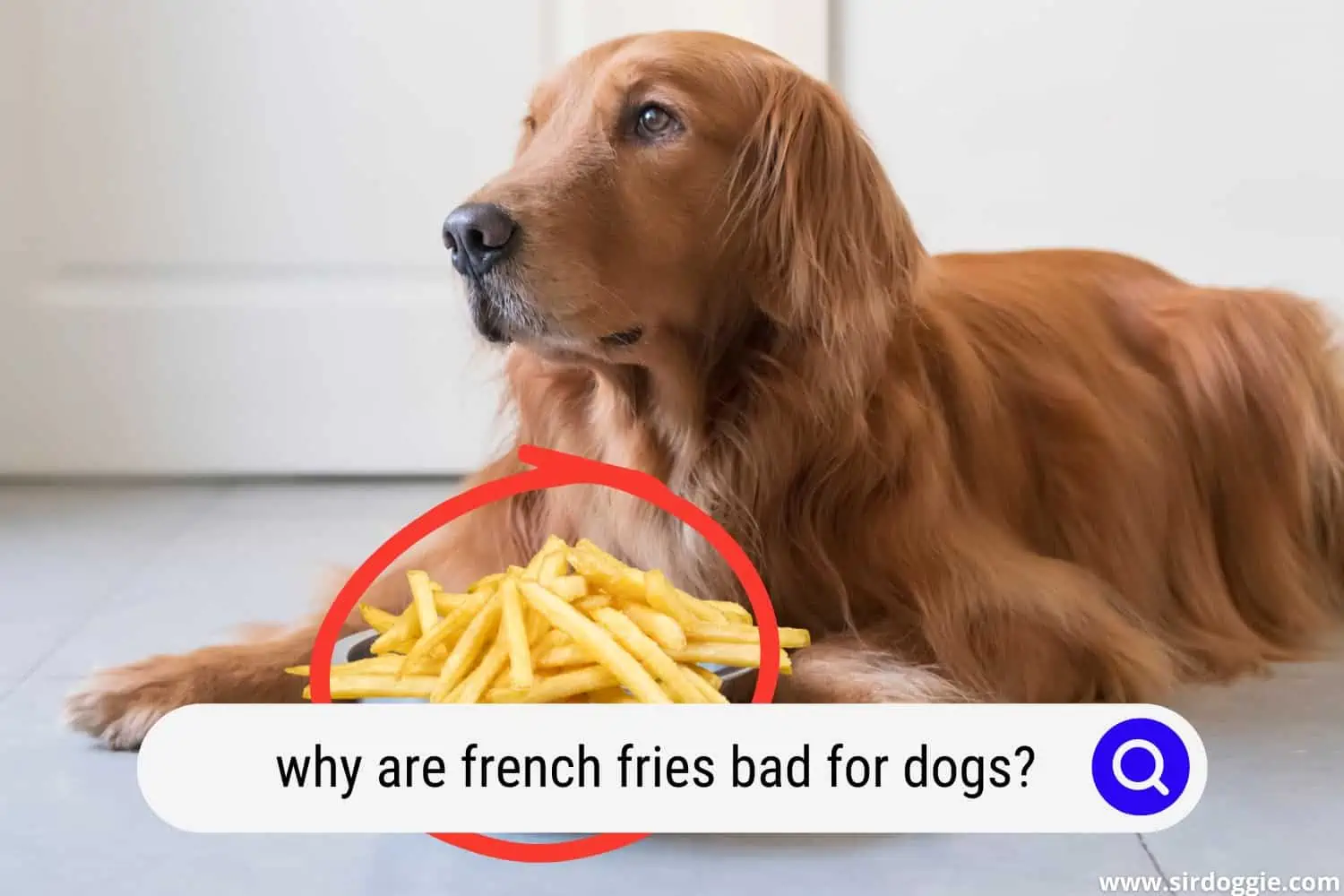Are French Fries Bad for Dogs? (The Simple Answer)
Are French Fries Bad for Dogs? Yes, french fries are bad for dogs and are considered unhealthy food for them. They are potatoes fried in vegetable oils and can upset your dog’s stomach, and digestive system, and cause blood sugar spikes.

French fries are a favourite food for a lot of Americans and anyone with a pooch knows that dogs love to partake in the meal rituals with their people.
It’s often safe to say, with few exceptions, that when something isn’t healthy for a human, it isn’t healthy for a dog.
You’re probably not surprised when you sit down to eat a bowl of French fries and your furry friend eagerly appears next to you, desperate for a taste.

Related Reading: Can My Dog Eat Cheerios? Are They Safe?
Why Are French Fries Bad For dogs?
Well, for mostly the same reasons they’re unhealthy for humans. They contain high quantities of sodium, fat, and oil.
Sodium
Dogs’ stomachs are not equipped for diets high in salt. Think about what happens when you pour salt on a leech—the animal dries out as the salt draws all of the water out of it.
You can imagine a similar effect when a dog consumes excessive salt.
Salt is dehydrating, to both dogs and humans, and it forces the body to work overtime in order to dissolve and digest the mineral. However, your body is a bit more adept at this process than your pups are.
Too much salt results in a lot of urination as your dog’s body attempts to dissolve and discard the mineral. As you can imagine, this is also very hard on the kidneys, and in extreme cases can even lead to kidney failure.
Fat
The fat found in French fries means the food is high in calories and has very little nutritional value. Therefore, it may come as no surprise that feeding your pup a consistent diet of French fries will make them gain weight—fast.
What is so dangerous about processed foods like French fries is that they are not filling like low-calorie foods are. If you give your dog one fry, they will want to keep eating and eating, and they will likely never feel full.
Obesity in dogs carries a lot of the same risks it does in humans, including cancer, heart problems, and diabetes, so it’s important to keep your dog at a healthy weight.
Oil
Most French fries are cooked in some type of vegetable or animal oil and simply put, oil is bad for one’s stomach.
If you’ve ever come home from a day of eating greasy foods at the state fair feeling nauseous or bloated, too much oil is the likely culprit.
Oil can make your dog gassy, as well as causing them to vomit and have diarrhea.
If you’ve ever experienced these symptoms, you will know firsthand that they are not fun, so don’t inflict them on your pooch!
Remember that they aren’t aware of the consequences of eating certain foods, nor do they connect the way they feel later with things they’ve eaten earlier, so keeping them on a straight and healthy path is your job.
Dogs Shouldn’t Eat Some Human Foods
Humans and dogs are both mammals, and we actually have a lot more in common than you might think. As a general rule, if a certain food is unhealthy for you, it is almost certainly unhealthy for your pooch.
Note: this does not always work the other way. Some foods that are healthy for humans, such as raspberries and grapes, can actually be toxic for dogs.
Because dogs have stomachs that are less adapted to cholesterol, saturated fat, oil, butter, and salt than human stomachs, what is only mildly unhealthy for a human can have disastrous consequences if fed to a dog, especially in large amounts.
Unfortunately for your pooch, french fries are one such food. They are not healthy for humans, but they’re even worse for dogs and should not be fed to them under any circumstances.

What if my dog ate French fries?
Relax. While French fries are clearly bad for your pooch, they are not toxic. If your dog only got one or two French fries, they will most likely be fine. As the quantity of French fries increases, however, so do the visible signs of distress.
Usually, these signs come in the form of digestive distress—they might vomit or have diarrhea because their stomach and digestive tract are not equipped to handle the fatty ingredients present in the fries. In extreme cases, French fries can lead to salt poisoning, but this is not common.
If your dog has eaten a large portion of fries, however, or if the fries in question are particularly salty, you should take them to the vet just to be safe.
Substitutes
Okay, so we’ve established that you probably shouldn’t share your French fries with your pooch. But what if they still want to partake in the sacred tradition of eating human food? Well, we’ve provided you with some healthy substitutes that are perfectly safe for your dog and they are sure to love them!
Unsalted Peanut Butter
Peanut butter contains plenty of wholesome, natural fats in contrast to the saturated, processed fats contained in French fries. Most dogs that try peanut butter for the first time come back begging for more.
Yogurt
Plain yogurt or naturally-flavored fruit yogurt is a yummy substitute that is rich in healthy probiotics.
Mozzarella Cheese
Mozzarella is a low-calorie dairy treat that is sure to satisfy your pooch’s eager taste buds.
Eggs
Fried and scrambled eggs are high in protein, and most dogs love them! Just don’t cook them in too much grease.

Final Thoughts
This video does a good job of summarizing some of the points discussed in this article.
Are French fries bad for dogs? The answer is a definitive yes.
While eating one or two fries on rare occasions will not affect your dog, it’s best to establish firm guidelines for what foods your pet can eat and what foods they can’t. Feed them one French fry, and they’ll think they are going to get one every time.
Instead of harming your dog’s body with fatty, salty foods like French fries, try to substitute healthy, wholesome human foods instead. We guarantee your pup won’t love you any less for it!

Family Dog Expert Author
Hi there! I’m Stuart, a devoted dog lover and family dog expert with over a decade of experience working with our furry companions. My passion for dogs drives me to share my knowledge and expertise, helping families build strong, loving bonds with their four-legged friends. When I’m not writing for SirDoggie, you’ll find me hiking, playing with my beautiful dog, or studying music.